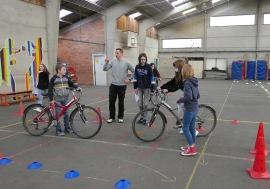From early childhood, John Bosco practised running, climbing trees, doing somersaults and jumps, tightrope walking and acrobatics. It was undoubtedly a natural outlet for his need for movement. But in his Memoirs he remembers above all the pleasure of the show, the tightrope walking, climbing the greasy pole, winning the race... In short, the success that brought him joy and allowed him to stand out in the small world around him.
But what about his mature years in Valdocco when he formed groups of rough teenagers looking for fun and overloaded with energy?
Were there sports in Valdocco?
Up until the end of the 19th century, there was no organised sport like football in Italian schools and clubs, even if children and adults played in the streets with a ball, following different rules: kicking it, throwing it with their hands, hitting it... Little by little, however, they began to play according to fixed and common rules which led to competitions between schools and clubs.
With Don Bosco it was not about organised sport, but about physical play in general: gymnastics, sack races, long jump... The difference is that play is an activity open to everyone, while sport is aimed at small groups of young people with a degree of skill. Don Bosco, that is, used physical games and gymnastics as an educational tool.
Play is essential
Don Bosco's concept of play was innovative, because recognising its usefulness, he saw the need for it for the integral development of young people. Play is essential for a young person's growth, because it helps direct their energies and impulses, control their strength and acquire a better sense of self through competition with others, favouring contact and interaction.
Don Bosco wanted a large courtyard for a large number of young people to play in. His idea of recreation was unusual for his time, because at the time people were content with a small area where they could walk in small groups and chat. But that was not enough for him: Don Bosco wanted movement, intense physical activity, although certainly not dangerous activity.
Educators also participate actively, but without abandoning their supervisory role. For Don Bosco it was very clear that in this way they did not lose their dignity, but, on the contrary, they gained the friendship and trust of the young people. He was convinced that this gave strength to their presence. He enjoyed participating in the games as much as possible and continued to guide them. He encouraged one, invited others, took the opportunity to leave advice or offer a word of sympathy for one or other youngster.
For Don Bosco, play was a great tool to drive away sadness and bad thoughts and avoids the disturbances associated with idleness and boredom: it creates an atmosphere of fun, joy and happiness, which he considered a prerequisite for education. And he knew it well, having experienced this joy as a child when acrobatics and physical feats became a spectacle that caused wonder and moved minds and hearts.
Fr Jean-François Meurs


